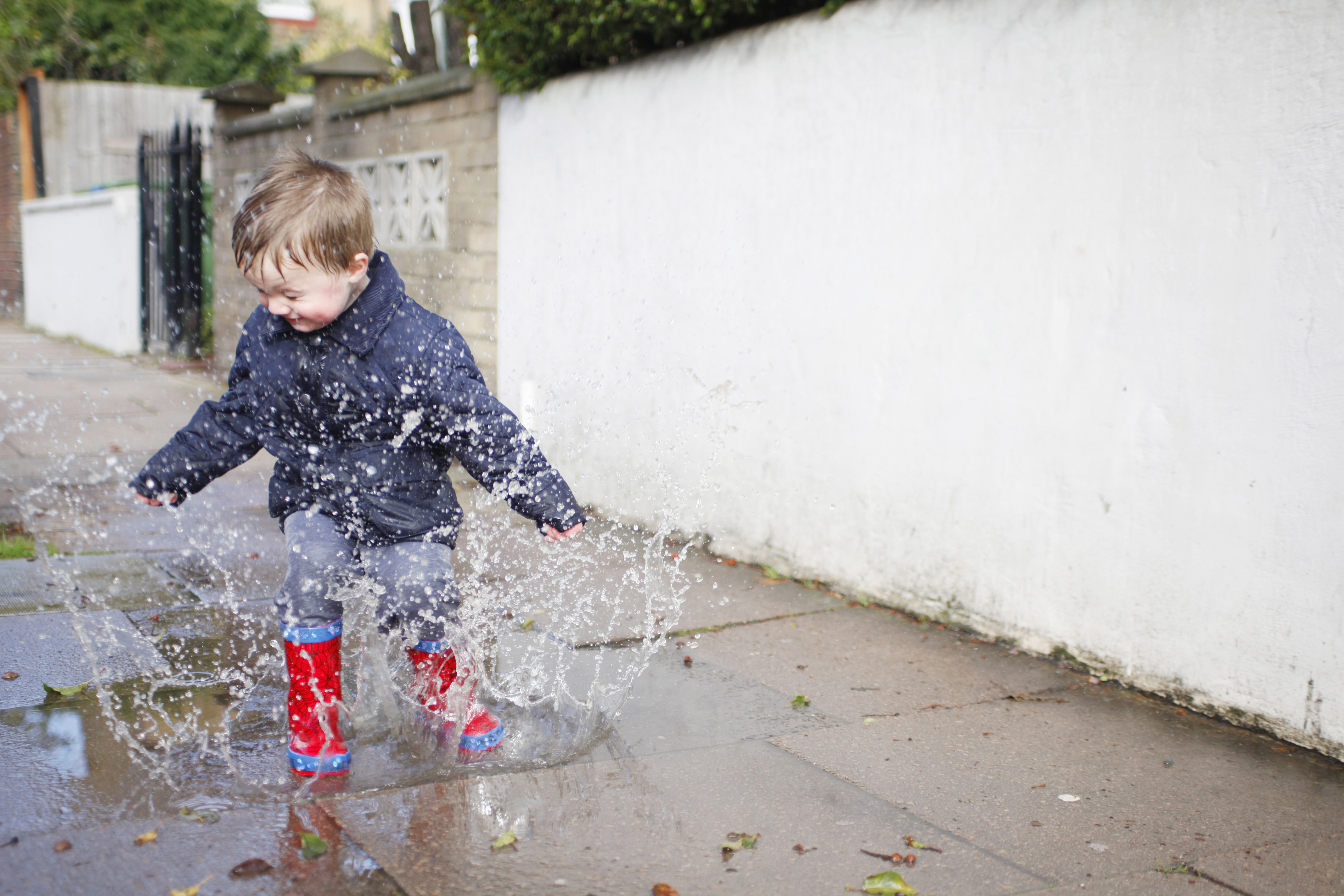12 expert-led tips to get your kids outside (even when they just don't feel like it)
We get it, sometimes we don't want to go outside either - but everyone sleeps better when they get some fresh air, right?


Getting your kids out and about has so many benefits, but sometimes they just don't want to leave the house - let me help you with that...
As a child development expert with over ten years' experience, I’ve seen first-hand the incredible benefits of outdoor play for children. It boosts their physical health, enhances their creativity, and fosters their social skills. Sometimes though, getting kids outside can really feel like an uphill battle especially if you’ve all had a long day at school or work, or when you don’t have the headspace to keep an eye on them with a never-ending list of priority chores to do. I assure you, you can overcome the challenge of getting kids outside.
Goodtoknow family editor, Stephanie Lowe relates to this: Gone are the days I could easily bundle my toddler out the door with promises of 'puddle hunting' now I have to make nature complete with Minecraft for my sic-year-old, and it's not easy. I like to think he's a homebird, in reality, I think he just really loves his Switch. So I am always up for trying new ways to get him out of the house." Stephanie adds: "Though I do think it's important to note that sometimes, you just need to hear your child and allow them rest if they need it."
Here are a few of my favourites to make outdoor play something your little ones will enjoy and at the same time keep it easy for you.
How to get the kids out the house (when they really don't want to)
- Make Outdoor Time Part of Your Routine
- Lead by Example (it’s easier than you think!)
- Make it fun
- Use Technology Wisely
- Embrace All Weather
- Create an Inviting Outdoor Space for Play
- Encourage Solo Play
- Integrate Play with Everyday Tasks
- Make it low-cost
- Get your kids looking forward to going out
- Tips for Different Ages
- Be positive and motivate yourself
1. Make Outdoor Time Part of Your Routine
Establishing a routine can make a big difference. Just like setting regular times for meals and homework, consider setting time aside for outdoor play. It can really help children get used to the idea and they will actually look forward to it. Whether it's a morning walk, an after-school play session, or a pre-dinner mess-about in the garden, consistency is key.
2. Lead by Example (it’s easier than you think!)
Kids are more likely to embrace outdoor activities if they see you doing the same. If you're not naturally inclined to spend time outdoors, and the sofa is more your friend when you have a moment to yourself, then start small. Try a short walk around the block, a simple gardening task, or even just sit outside with a book, weather permitting of course. Your enthusiasm (or at least your willingness to try) can be contagious.
3. Make it fun
Outdoor play is exciting - there’s a whole world to explore! Try to make sure it doesn't feel like something your kids only do because it’s good for them.
Parenting advice, hot topics, best buys and family finance tips delivered straight to your inbox.

Why not turn it into an adventure: create ‘treasure’ hunts, set up obstacle courses, or play classic games like hide and seek as a family or start them off between siblings. The goal is to make outdoor play so much fun that children will want to do it for its own sake - the many other wellbeing benefits that being outside brings are a bonus.
4. Use Technology Wisely
While it might seem counterintuitive, tech’ and screen time when used wisely can actually encourage outdoor play. Apps and games that promote exploration, such as geocaching, or those that teach about nature, like plant identification apps, can add an exciting dimension to your outdoor adventures.
5. Embrace All Weather
Don’t let the weather be a deterrent. It’s the old adage - it’s not the wrong weather, it’s the wrong clothes! With the right kit, almost any weather can be suitable for outdoor play. Rainy days can be perfect for puddle jumping for youngsters, while warmer days offer opportunities for water play and picnics.
6. Create an Inviting Outdoor Space for Play
You don’t need a sprawling garden, football pitches, slides and trampolines to make outdoor play appealing for the everyday. Even a small patio or a tiny garden space can be transformed into an inviting play zone for your family. Add some potted plants, a sandpit, or a few outdoor toys and involve your kids in the process of setting up the space—they’re more likely to use it if they’ve helped create it. A bucket of water, a paintbrush and a brick wall can be a fun way for children to get creative.
7. Encourage Solo Play
Outdoor play doesn’t always mean a play-date. Encourage your child to enjoy solo activities like reading a book under a tree, drawing with pavement chalk, or watching insects. Simple moments of solitude go a long way to fostering independence and creativity
8. Integrate Play with Everyday Tasks
Combine outdoor play with everyday tasks where you can. Let your kids help with gardening, washing the car, or walking the dog. These activities not only get them outside but also teach them valuable life skills. By making outdoor tasks playful, children learn that being outside can be a natural and easy part of their day.
9. Make it low-cost
Outdoor play can be cost-free. Simple pleasures like climbing trees, collecting leaves, or going to the playground can be just as enjoyable and beneficial as paid-for days out. The best things in life are often free, and nature is the perfect example and a brilliant playground.
10. Get your kids looking forward to going out
For younger children, storytelling about the outdoors can work wonders. Start off a conversation with “Let’s go find fairies in the garden!” or “How many different types of birds can we spot today?” Older children might respond better to a challenge, such as “Let’s see if we can walk to the top of that hill faster than last time.”
11. Tips for Different Ages
For younger children, simple activities like playing with water or sand can be loads of fun. Older kids might enjoy more structured activities like sports or an outdoor ‘camp’ in the back garden. When motivating teens, try involving their friends or perhaps incorporating tech-savvy elements like nature photography or fitness apps which is a great way of motivating them to enjoy outdoor space.
12. Be positive and motivate yourself
We all have days when we just can’t be bothered to do what we know is good for us so there will of course be days when your child resists going outside, and that’s okay. It takes time for habits to form and they will soon come to appreciate and even look forward to their outdoor time.
If you find that you’re the blocker and it’s hard to get motivated particularly if you have little ones that need 100% supervision, just remind yourself of the benefits. Outdoor time is not just good for your kids; it’s great for you too.
Fresh air, a change of scenery, and physical activity can improve your mood and energy levels. Just start with small, manageable goals and gradually increase the time you spend outside. Pairing up with another parent or friend for outdoor activities can also provide mutual encouragement.
By following a few practical tips, you’ll not only help your kids enjoy the great outdoors but also foster their overall development and well-being. So, grab your coat (or sunscreen), and head outside for some fun
Like this? Dr Amanda Gummer is an expert on our GoodtoKnow panel and she shares her decades of expertise across our site from the helpful Why do boys play with trucks? to the insightful 3 stages of play every kid needs not forgetting her four expert-approved ways to support autistic play - a great read.

Dr Amanda Gummer has a PhD in Neuropsychology, the Postgraduate Certificate in Higher Education and more than 20 years’ experience working with children and families. As such, she is renowned as an expert on all aspects of child development, including toys and play. In 2012, she founded The Good Play Guide, an independent, expert accreditation service for children’s products, including toys, apps and more.